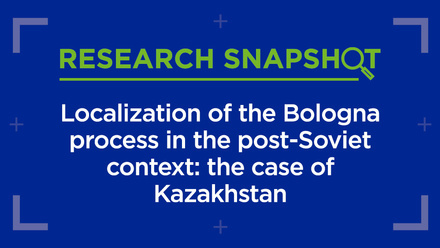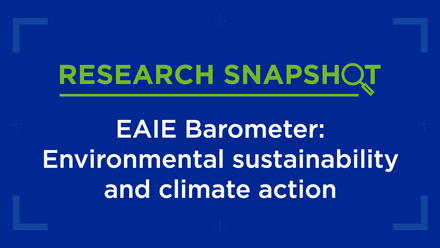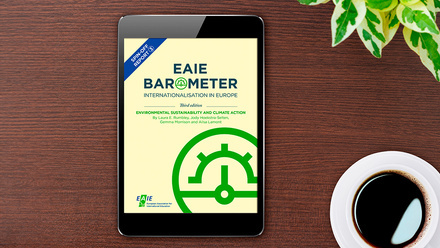Building bridges: Crafting a transdisciplinary future through joint programmes

In a world increasingly defined by global challenges, universities are breaking down borders to collaborate and find solutions. Joint programmes, like the CIVIS Joint Master's in Transdisciplinary Studies of Climate, Environment and Energy (TRACEE for short), are key to these efforts, offering students a unique chance to engage with the world’s most pressing issues across academic disciplines and cultures. But how do universities overcome the complexities of developing such ambitious programmes?
In CIVIS, Europe’s Civic University Alliance, we’re learning valuable lessons as we create joint programmes that cross borders and connect disciplines. In this blog we'll explore what we’ve discovered so far and discuss how you can apply these insights to your own efforts.
Studying across different academic and cultural environments provides students with diverse perspectives and skills, preparing them to tackle real-world problems with adaptability and confidence.
Why joint programmes matter
Joint programmes offer students more than just the chance to study internationally, they equip the next generation with the tools to address urgent global challenges. By pooling resources, expertise and research capacities, universities can develop solutions that no single institution could tackle alone.
In CIVIS, developing joint programmes that lead to joint or multiple degrees is a priority. Alongside the CIVIS joint master's in Transdisciplinary Studies of Climate, Environment and Energy, we are working on developing further Bachelor’s, Master’s and doctoral programmes, and have already launched a triple master’s degree in Palaeolithic Archaeology. These programmes — which employ innovative formats such as Blended Intensive Programmes (BIPs), micro-credentials, micro-programmes and Collaborative Online International Learning (COIL) — reflect our commitment to offering flexible, cutting-edge learning opportunities.
For students, the benefits are clear: studying across different academic and cultural environments provides them with diverse perspectives and skills, preparing them to tackle real-world problems, like climate change, with adaptability and confidence.
CIVIS HUBs: A collaborative approach to global challenges
The CIVIS joint master's in Transdisciplinary Studies of Climate, Environment and Energy is developed within the framework of HUB1, part of CIVIS’ five thematic HUBs that drive inter and transdisciplinary collaboration across the Alliance. These HUBs bring together academic expertise to address major societal challenges through innovative education and research projects.
Each HUB is governed by a council of representatives from both full and associate member institutions, along with student representatives. Together, these councils guide CIVIS’ academic and research endeavours, ensuring that all projects align with the Alliance’s mission to address global challenges through collaboration and keep the community involved in these actions.
The challenge of climate change calls for transdisciplinarity, meaning that scholars need to speak one another's language so that we can build solutions together on multiple levels.
Lessons from the frontlines of collaboration
1. Navigating institutional differences
Developing joint programmes means navigating the diverse policies, procedures and cultures across partner universities. Differences in course credit recognition, administrative processes and governance structures can create challenges, but they’re not insurmountable.
Our tip: Establish clear communication and a decision-making structure early. In CIVIS, we set up an Interim Board for this programme, with representatives from all partner institutions and from CIVIS bodies, both academic and administrative. This collaborative approach allowed us to address issues quickly and keep the programme on track.
2. Building a shared vision
Transdisciplinary collaboration requires a unified vision, especially when different academic fields and external actors are involved. The CIVIS TRACEE programme brings together expertise from across disciplines to address climate and energy challenges. As Professor Alasdair Skelton aptly puts it: "The challenge of climate change calls for transdisciplinarity, meaning that scholars need to speak one another's language so that we can build solutions together on multiple levels."
Our tip: Take the time to align the goals of all partners. Regular workshops and planning sessions are essential for building a common vision, especially when dealing with complex issues that require input from diverse fields. It would be ideal to organise both physical and virtual meetings and workshops. So, be sure to put aside resources for this.
3. Engaging university structures early
Ensuring a programme’s feasibility means engaging both Alliance-level structures and the governance and operational frameworks of each partner university. These support systems are crucial for keeping everything running smoothly and ensuring the programme aligns with institutional requirements.
Our tip: Involve key stakeholders early. Engaging academic and administrative teams from both the Alliance and individual universities from the start can help avoid delays and streamline the process.
Harnessing the power of collaboration
Being part of an alliance like CIVIS offers access to well-established support structures. The CIVIS Units and CIVIS Officers, along with institutional resources at each university, play a crucial role in coordinating activities, managing resources and ensuring that joint programmes operate seamlessly across borders.
Our tip: Leverage both centralised Alliance-wide support and local institutional expertise. This combination allows us to manage complex joint programmes more effectively, bridging gaps and aligning processes across multiple universities.
Fostering stronger collaboration between higher education institutions and governmental bodies is essential for streamlining the development of joint programmes.
Innovating for sustainability
Sustainability isn’t just a goal for the TRACEE programme, it’s embedded in its design. From the beginning, we focused on securing diverse funding sources, including support from the European Universities Initiative. Notably, this programme has already received Erasmus Mundus Design Measures funding, earning a maximum score, and we are preparing to apply for Erasmus Mundus Joint Master funding. These efforts will help ensure that the programme remains resilient and adaptable in the long term.
Our tip: Plan for sustainability from day one. Whether it’s sharing administrative responsibilities or diversifying your funding streams, building a programme that’s designed to last requires forward-thinking strategies from the outset.
Overcoming challenges and advocating for change
While the development of joint programmes brings many benefits, it also comes with significant challenges, particularly in navigating the diverse regulatory landscapes of different countries. Aligning national accreditation systems, ensuring mutual recognition of qualifications and overcoming bureaucratic barriers can slow down progress.
One of the major challenges lies in mobility funding schemes. For joint programmes not part of the Erasmus Mundus actions, mobility funding is often insufficient, and rules and regulations may not be fully compatible with intra-programme mobility. Erasmus+ funding schemes, for example, cover up to 12 months, which is not always enough to support students’ participation in extensive joint programmes (where students are expected to travel for three out of four semesters, in case of a Master’s degree programme). This gap in funding can limit student mobility and restrict access to the full international experience that these programmes are designed to offer.
However, these challenges also present an opportunity to advocate for policy changes at both European, national and institutional levels. In CIVIS, we believe that fostering stronger collaboration between higher education institutions and governmental bodies is essential for streamlining the development of joint programmes. By working closely with European and national authorities, we aim to address funding limitations, simplify accreditation processes and promote the recognition of joint degrees across borders.
As we continue to develop joint Bachelor’s, Master’s, and doctoral programmes, we are committed to advocating for policies that enhance intra-programme mobility, provide sufficient financial support and create a more flexible, supportive framework for international education, as we did through the European Degre piloting process (CIVIS coordinated the SMARTT project).
Today, we’re all moving forward together, like a team in an electric minivan, towards the programme’s launch and beyond.
A journey, not just a destination
Developing a joint programme can be likened to a journey. In CIVIS, this journey started with a visionary academic – the ‘man on the bike’ – who recognised the need for transdisciplinarity in addressing climate challenges. From that vision, more colleagues joined the effort, expanding the project. Today, we’re all moving forward together, like a team in an electric minivan, towards the programme’s launch and beyond.
But the journey doesn’t end there. This programme will serve as a platform for continuous growth, a place where new ideas are born, new projects take root, and new pathways emerge. The collaborative spirit that has driven this programme will continue to guide its evolution.
Practical tips for other institutions
For institutions looking to set up their own joint programmes, here are some actionable tips based on our own experiences:
-
Start small: Piloting a programme or even just co-creating a joint course before scaling it up allows you to get to know your partners, identify potential challenges early and refine your approach.
-
Engage early: Involve both academic and administrative stakeholders from the beginning to ensure smooth coordination across institutions.
-
Focus on students: The student experience should guide your planning. Clear communication on mobility, administration, and academic expectations is key to avoiding unnecessary hurdles.
Final thoughts
Developing a joint programme is challenging, but the rewards are well worth the effort. Our journey with the CIVIS Joint Master's in Transdisciplinary Studies of Climate, Environment, and Energy has shown that collaboration between universities can lead to innovative, dynamic educational experiences that prepare students to tackle global challenges. Whether you’re just starting or expanding your own joint programme, the future of international collaboration is in your hands.






